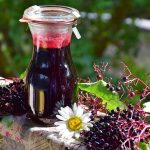Elderberry may be an important ally against inflammatory bowel disease, new study suggests
 (NaturalHealth365) Inflammatory bowel disease, or IBD, is a chronic condition affecting approximately 3 million American adults. The two most common varieties of IBD – Chron’s disease and ulcerative colitis – feature symptoms of diarrhea, abdominal cramping, weight loss, joint pain, and fatigue. Unfortunately, rates of this potentially serious condition are on the rise, with the Crohn’s and Colitis Foundation of America reporting that roughly 70,000 new cases are diagnosed every year.
(NaturalHealth365) Inflammatory bowel disease, or IBD, is a chronic condition affecting approximately 3 million American adults. The two most common varieties of IBD – Chron’s disease and ulcerative colitis – feature symptoms of diarrhea, abdominal cramping, weight loss, joint pain, and fatigue. Unfortunately, rates of this potentially serious condition are on the rise, with the Crohn’s and Colitis Foundation of America reporting that roughly 70,000 new cases are diagnosed every year.
Hence, researchers’ ongoing quest for non-toxic, natural nutrients that can help ease the intestinal inflammation that characterizes IBD. Many holistic physicians believe that elderberry extracts – which have long been valued as an herbal intervention to boost immune health – can also help address gastrointestinal diseases, such as IBD. In fact, new research suggests that they are correct.
A recent clinical study published in the International Journal of Molecular Science reveals that elderberry extracts can decrease pro-inflammatory molecules in the gut.
Elderberries are rich in anthocyanins, a group of antioxidants
At first glance, tiny, purplish-black elderberries don’t appear particularly impressive. But these unassuming-looking little berries are absolutely crammed with potent antioxidants, including quercetin, rutin, flavanols, and phenolic acids. They are also rich in vitamin C, which has powerful anti-inflammatory, antioxidant, and immune system-boosting capacities of its own.
In addition, their dark purple hue is a testament to their high content of anthocyanins, a group of antioxidant plant pigments. Botanically known as Sambuca nigra, elderberry was used by Native Americans to treat fever and respiratory illnesses – a traditional use that appears to be supported by modern research. In an influential 2018 meta-analysis published in Complementary Therapies in Medicine, the authors reported that elderberry helped to relieve upper respiratory symptoms such as runny nose, congestion, and cough.
But elderberry has even more to offer.
Elderberry helps to balance immune response and decrease inflammation
The new 2023 study involved 53 healthy volunteers who received a daily elderberry extract infusion for four weeks. The scientists found that the elderberry extract modulated immune system function by reducing levels of pro-inflammatory chemicals and pointed to “significant” decreases in pro-inflammatory markers such as interleukin-6, interleukin-8, tumor necrosis factor-alpha, and C-reactive protein.
The fact that elderberry can help modulate the immune system is significant, as IBD is triggered by the immune system’s overreaction to ordinarily innocuous substances such as food or microbes.
Simultaneously, an extensive new analysis published in the European Review of Medical and Pharmacological Science and titled “Efficacy of traditional herbal formulas on human immunity” highlights elderberry’s ability to boost the immune system. The authors pointed out that immune system components must be regularly modified to maintain the body’s defenses against ever-evolving microbes that are constantly looking for new ways to attack. Immune-modulating nutrients such as elderberry (along with zinc, vitamin C, and echinacea) can help the body outwit pathogens, making these nutrients valuable in boosting impaired immune function.
Gut health, immune system health, and inflammation levels are deeply connected
Elderberry has prebiotic properties, meaning it provides nourishment for beneficial gut bacteria. This can improve the balance of the gut microbiome and help to regulate inflammation. And by enhancing gut health, elderberry increases immune health as well. Gut health and immune system health are related – not so surprising when you consider that 80 percent of the immune system is located in the gut.
While research on humans is limited, cell and animal studies cited in a review published in the Journal of Agricultural and Food Chemistry have demonstrated that elderberry strengthens the integrity of the intestinal barrier, thereby improving intestinal permeability (also known as “leaky gut”) and helping to prevent pro-inflammatory toxins and pathogens from entering the bloodstream. In fact, elderberry extract has been shown to interfere with the production of pro-inflammatory molecules specifically linked to increased intestinal permeability.
It’s also worth noting that elderberry’s benefits extend beyond easing IBD. Holistic doctors often advise it to promote efficient digestion and alleviate occasional constipation.
Fine-tune digestive health and reduce inflammation with elderberry supplementation
Elderberry extract is available in capsules, powders, syrups, lozenges, and gummies. Look for a high-quality product that has been certified by a recognized authority, such as USP or NSF International. Before supplementing with elderberry, consult your holistic healthcare provider. And, don’t try to address IBD – or any other medical condition – with elderberries unless you are under the guidance of a qualified healthcare provider.
By the way, tart, nutritious elderberries make a great addition to your diet – with one important caveat. The berries must be thoroughly cooked before eating, as they are toxic and can cause nausea or vomiting when consumed raw. Simmer cooked elderberries into homemade jellies and jams, bake them into pies or tarts, or stir them into yogurt or oatmeal. Cooked elderberries also make a refreshing addition to your favorite fruit smoothie.
However you choose to access the benefits of elderberries, research suggests that these tiny fruits have much to offer. When it comes to fighting inflammation and boosting the immune system, elderberries deliver a potent one-two punch that may help you end the threat of IBD.
Sources for this article include:
NIH.gov
NIH.gov
ScienceDirect.com
Healthline.com
Willner.com
AmericanChemicalSociety.org
MayoClinic.com



